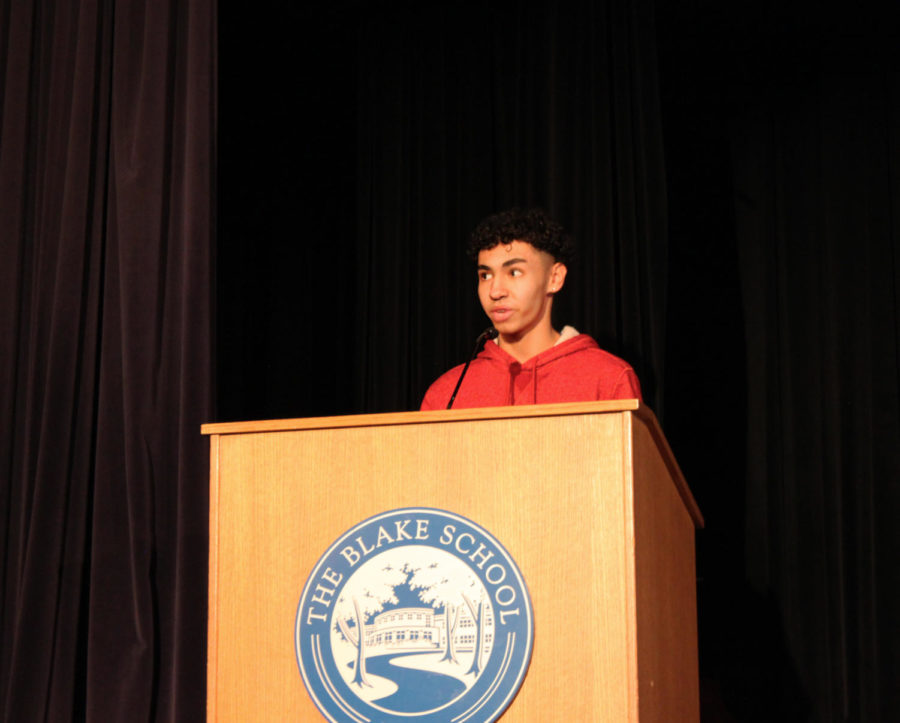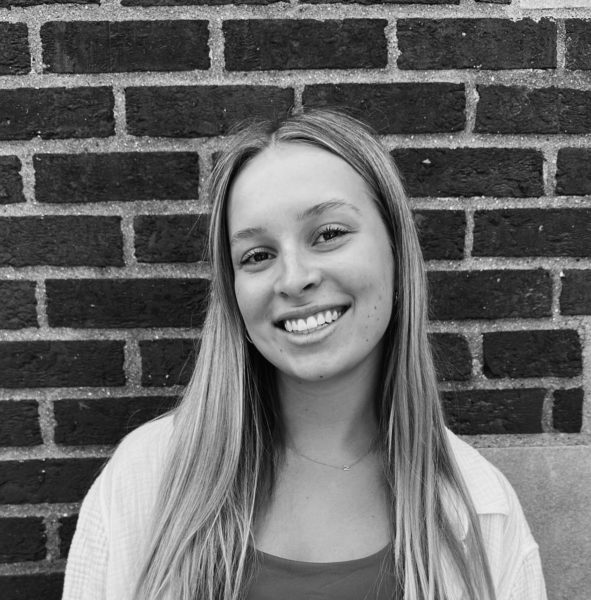“Word for word, there was nothing from my first draft that made it into my final speech,” says, Julia Enebo ‘23. Enebo is not alone, but rather many seniors this year would agree that they’ve experienced some sort of censorship when creating their speech.
Abby Ziehl ‘23 explains, “They told me that if I did give my [original] speech, I wouldn’t be able to graduate.”
The “they,” as Ziehl says, that hands out the censorship, is a vague entity of the administration. Lily Erlandson ‘23 explains, “I don’t know who it was. [Sandy] Berkowitz just said ‘the school’ so it was unclear who was in charge of that.” Enebo agrees, adding, “Specifically, Sandy Berkowitz was the one who censored me, but I get the vibe that it was more her job to be the one who said I couldn’t. I don’t think it was her fault […] I got the impression that [the censorship] was coming from higher ups, people higher up than Joe [Ruggiero] and Sandy [Berkowitz].”
Director of the Upper School, Joe Ruggiero, clarifies that Berkowitz, who leads the Senior Speech Program, consults with Associate Director Sarah Warren, the counselors, or the grade deans when she comes across “concerning topics that could impact the audience in some detrimental way.”
The general consensus from seniors is that these “detrimental topics” that were reviewed and removed from speeches by administrators were mostly specific and explicit details about mental health struggles. Ruggiero explains that the administration welcomes and encourages discussions on mental health topics, however, he explains that “the issue is when people get up there and talk about events that could be triggering for people in the audience.” He elaborates, “People talk about censorship, but the issue is that students are captive in [the auditorium]. When you watch a TV show, go to a movie, or attend a speech, that’s voluntary … But we require students to be in [assembly]. You have to attend, so it’s not fair to have a captive audience and say things that could be triggering or detrimental to several people in the audience.”
Berkowitz echoes this saying, “I try to work very hard with the students so that they can give the speech that they want to give while at the same time being mindful of the needs of the audience and the needs of the school. I recognize that there are some people who feel like they’re being censored. I try to make it so that they can still give the speech that they want to give within the parameters.”
Seniors acknowledge the potential impact their speeches could have on the audience. Gaurav Haldar ‘23 adds, “I wanted to reference cuts and specific self harm things that I have done to myself and [Sandy Berkowitz] didn’t want me to do that because she thought it would be a sensitive topic for a lot of people, which I completely get. I proposed the idea of putting a trigger warning at the beginning of my speech and she didn’t really agree with that and thought it would be better if I just used the word ‘self harm.’”
Enebo agrees saying, “They said it could trigger people in the audience who don’t have the same help that I have. But that was the extent of what I was told.” She continues, “people that aren’t going through what you are speaking about are not the people to tell you what is triggering and what is not … The whole [idea that] talking about suicide is triggering or can cause depression to worsen is completely false and that narrative is literally why it is not talked about now.”
Ruggiero explains that the purpose of senior speeches is to give something to the community. He continues, “It’s not about your own personal gripes or a cathartic movement to let people know what your opinion on something is. It’s about providing a service to the community because you have a captive audience for however many minutes your speech is. So it’s really about giving something back at the end, and it’s what the purpose should be.”
Seniors acknowledge that their speeches are meant to help the community. Zoe Edinburgh ‘23 says, “I think we need to be giving these speeches because it actually does help our student body. I got a lot of text messages and emails after saying things like ‘thank you for giving this speech.’”
Haldar agrees adding, “I didn’t write it to bash Blake or bash the Blake community in any way. I did it to raise awareness because I want to see that improvement in Blake and see Blake become a more inclusive space for BIPOC students.”
According to the seniors, however, they were told to take out many parts of their speeches that could have helped the community. Erlandson explains, “I had to cut out some parts that show my story that I would have liked to have shared. I think a lot of people could have related to it, but I wasn’t able to do that.”
Other speeches that were commonly flagged by the administration were those that had to do with the school. Ziehl explains, “I was told that I was not allowed to give the speech because it mentioned Blake.” She continues, “Blake needed to be in my speech. It was [about] a Blake student who isn’t here anymore … It felt like the [administration] was protecting him.”
Ruggerio, however, clarifies that, “people can talk about Blake all they want, even if it’s disparaging. I think we need to hear criticism. That’s how you get better. To hear what are students’ experiences good and bad. You wouldn’t be allowed, for example, if you had a grudge against a particular teacher, to get up there and name the particular teacher and say why you don’t like them. That’s not appropriate.”
Ziehl believes that the censorship she received was a result of one of last year’s speeches, and Ruggiero seems to confirm this. He says, “[There’s] a whole history with last year where we had a student who wasn’t named [in a speech], but who, for all intents and purposes, was called out. That was bad. At the same time, having a student be able to talk about the fact that [they were] experiencing something traumatic … is important, so the school is constantly balancing those two things.” He continues, “What happened last year, split the community so deeply, and especially the [Class of ‘22]. So what was the purpose of that? So one person gets to speak their truth, but then you spend a year with a community in shambles? I don’t think that’s worth it.”
Regardless of the reasoning for censoring speeches, seniors feel deeply frustrated about not being able to say what they want, the entire premise of the senior speech program.
Ziehl explains, “We were told that we could give a speech about whatever we want. A lot of people choose those [harder] topics because they’re really important to them. So it’s just really annoying that those are the same topics that they don’t really want us to give.”
Ellie Nixon ‘23 adds, “It’s not fair to people who want to convey an important message that half of what they say or more than half of what they say, they can’t say. There’s no point in their speech if they can’t actually say what they want”
Enebo concludes, “The fact that it is hard to hear is the point. The fact that it is hard to hear should not be the reason in which you don’t give it.”















